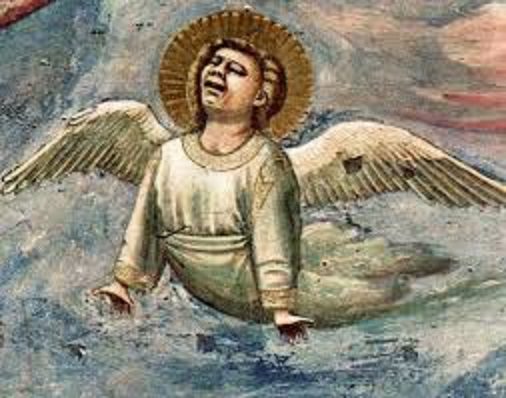Are there reasons to be hopeful even on those days that Nazis, white supremacists, racists, and unhinged politicians are sucking the air out of the room? Yes–but we need to know where to look.
I have been blogging for five years; one of the many things I’ve learned over that time is that I should generally resist the temptation to immediately post something in response to the latest news cycle. Blogging for me is an expression of thinking in writing—and thinking almost always requires a bit of time. I’ve found Twitter to be useful for quick, off-the-cuff, sometimes knee-jerk responses to things—perhaps that’s why the President likes it so much—but I want my blog to do something more than react. Especially when my emotional self is urging me to throw any number of “WTF’s” unfiltered out into the blogosphere in reaction to the latest idiocy, I do well to remember to breathe, think, and write about it a day or two later (maybe).

Last Tuesday was a case in point. I think millions of Americans already knew that Donald Trump has an acute case of what Kurt Anderson, in the cover article of the latest issue of The Atlantic, calls “Kids R Us syndrome”: the President is a spoiled, impulsive, moody 71-year-old brat and bully—with all that entails. What we found out on Tuesday, after Trump robotically read a statement on Monday—48 hours after the events in Charlottesville, Virginia over the weekend—is what he really thinks. By refusing to take the easiest layup in American politics and simply say unequivocally that Nazism, white nationalism, the KKK, and similar ideologies are evil and have no place in America, he left little doubt concerning his moral compass. He doesn’t have one. Neither is he capable of fulfilling the role of President and representing this great country. Against all odds, the American people chose to follow electing the first African-American President in our history (twice, no less) with electing a narcissistic, uninformed, frequently unhinged racist to the highest office in the land and as the most powerful person in the world. This is not good news.
As if that wasn’t enough, Jeanne and I—apparently due to a previously undetected masochistic streak in both of us—chose Tuesday evening to see the new Al Gore movie, An Inconvenient Sequel. I’ll have more to say about that in my next post on Sunday—suffice it to say that observing the work that 150+ heads of state, in addition to the monumental efforts of people like Gore behind the scenes in Paris, put into the Paris Climate Accord being successfully negotiated and signed, all the time knowing that a few months later our current Idiot-in-Chief would withdraw the U. S. from the agreement, did little to raise our spirits. Where is one to find hope for our country, perhaps even for our survival, in times like these? As is frequently the case, I find myself looking to familiar texts and experiences that might speak to what seems so overwhelming.
Of the many varieties of liturgical celebration I have encountered over the past several years, including a number of them at St. John’s Abbey in Minnesota (the Benedictines know how to do liturgy better than anyone), the most striking is the Good Friday morning prayer service I have experienced twice with the monks at the Abbey. At 7:00 in the morning, the service sets the tone for the most somber day in the Christian calendar as a solitary monk chants the entire book of Lamentations from the Jewish scriptures. Lamentations is the most depressing book in the Bible, perhaps anywhere, a litany of five poetic dirges over the destruction of Jerusalem. Traditionally attributed to the prophet Jeremiah, the tone of the poems is bleak: God does not speak, the degree of suffering is presented as undeserved, and expectations of future redemption are minimal. In Psalm 129 the Psalmist writes “Plowmen have plowed my back and made their furrows long”—Lamentations is page after page of that sentiment.
But just about half way through the poems, Jeremiah comes up briefly for air.
I will call this to mind, as my reason to hope:
The favors of the Lord are not exhausted, his mercies are not spent;
They are renewed each morning, so great is his faithfulness.
My portion is the Lord, therefore will I hope in him.
Good is the Lord to one who waits for him, to the soul that seeks him;
It is good to hope in silence for the saving help of the Lord.
The favors of the Lord are renewed every morning (sort of like Donald Trump’s tweets)—but we have to practice identifying and relying on them. Here are a couple from my past week—new life and beauty—reasons to hope that remind me, once I stop yelling WTF!!! at the television screen, that while the news cycle comes and goes, the divine is always present.
 A friend from Canada visited Jeanne and me over the past week with her seven-month-old son in tow. Jeanne and I are grandchild-less (although we do have grand-dogs), and there is little sign of grandkids in the near (or even distant) future. Jeanne has visited Anita and Eliot in Toronto twice and is unofficially Eliot’s surrogate grandmother (“Gigi,” Jeanne insists), but this was their first visit to Providence (and the first less-than-a-year-old human being’s extended visit to our house ever, to my recollection). Our dachshunds had never encountered a baby and were not quite sure whether Eliot was a noisy visitor from another planet or the strangest looking dog they ever saw.
A friend from Canada visited Jeanne and me over the past week with her seven-month-old son in tow. Jeanne and I are grandchild-less (although we do have grand-dogs), and there is little sign of grandkids in the near (or even distant) future. Jeanne has visited Anita and Eliot in Toronto twice and is unofficially Eliot’s surrogate grandmother (“Gigi,” Jeanne insists), but this was their first visit to Providence (and the first less-than-a-year-old human being’s extended visit to our house ever, to my recollection). Our dachshunds had never encountered a baby and were not quite sure whether Eliot was a noisy visitor from another planet or the strangest looking dog they ever saw.
As Eliot led Anita through his daily routine of sleeping, eating, smiling, crying, and checking out the world that is still new to him, she occasionally asked me if having Eliot around brought back memories. To be honest, it really didn’t—my sons are in their middle thirties and my sixty-plus year old memory banks have not preserved a lot of the daily routine of when they were Eliot’s age. But what Eliot’s visit did put me in mind of was exactly the sort of thing Jeremiah wrote about. The mystery of new life, the wonder and expectations that are attached to a new human being, the miracle of a baby’s smile lighting up the room moments after the same baby’s crying had everyone scrambling for solutions—these are the divine favors that are renewed every morning. There is nothing more full of hope and promise than a new human being.

 Jeanne had several things planned to do with our guests during their visit (people don’t visit us much)—one was going to “The Butterfly Place,” a butterfly conservatory a bit over an hour away in southern Massachusetts. Jeanne and I had been there once before several years ago—this time there were more butterflies of more varieties than we remembered. The Butterfly Place was filled both with brightly colored flying insects and a remarkably diverse collection of human beings, all of whom were enthralled by the little instances of gratuitous beauty flying around.
Jeanne had several things planned to do with our guests during their visit (people don’t visit us much)—one was going to “The Butterfly Place,” a butterfly conservatory a bit over an hour away in southern Massachusetts. Jeanne and I had been there once before several years ago—this time there were more butterflies of more varieties than we remembered. The Butterfly Place was filled both with brightly colored flying insects and a remarkably diverse collection of human beings, all of whom were enthralled by the little instances of gratuitous beauty flying around.
 Each of us was gifted with a butterfly landing on us; the Darwin-lover in me reveled in the spectacular patterns and colors on display which, as is so often the case in the natural world, seem far beyond what any reasonable or rational artist would ever have thought up. In answer to my question “What ecological role do butterflies play?”, which was a fancy way of asking “What are they for?”, one of the knowledgeable people on staff essentially said that other than food for birds (their bright colors are a warning to birds that “I don’t taste good”), they don’t have that much of a role. They only live for a couple of weeks, then are gone—the embodiment of gratuitous beauty if there ever was one.
Each of us was gifted with a butterfly landing on us; the Darwin-lover in me reveled in the spectacular patterns and colors on display which, as is so often the case in the natural world, seem far beyond what any reasonable or rational artist would ever have thought up. In answer to my question “What ecological role do butterflies play?”, which was a fancy way of asking “What are they for?”, one of the knowledgeable people on staff essentially said that other than food for birds (their bright colors are a warning to birds that “I don’t taste good”), they don’t have that much of a role. They only live for a couple of weeks, then are gone—the embodiment of gratuitous beauty if there ever was one.
The wonder of new life. The gratuitous beauty of the natural world. These are some of the places to encounter divine favors every day—even on those days that Nazis, white supremacists, racists, and unhinged politicians seek to dominate with their noise and vitriol. These are reasons to be hopeful.













